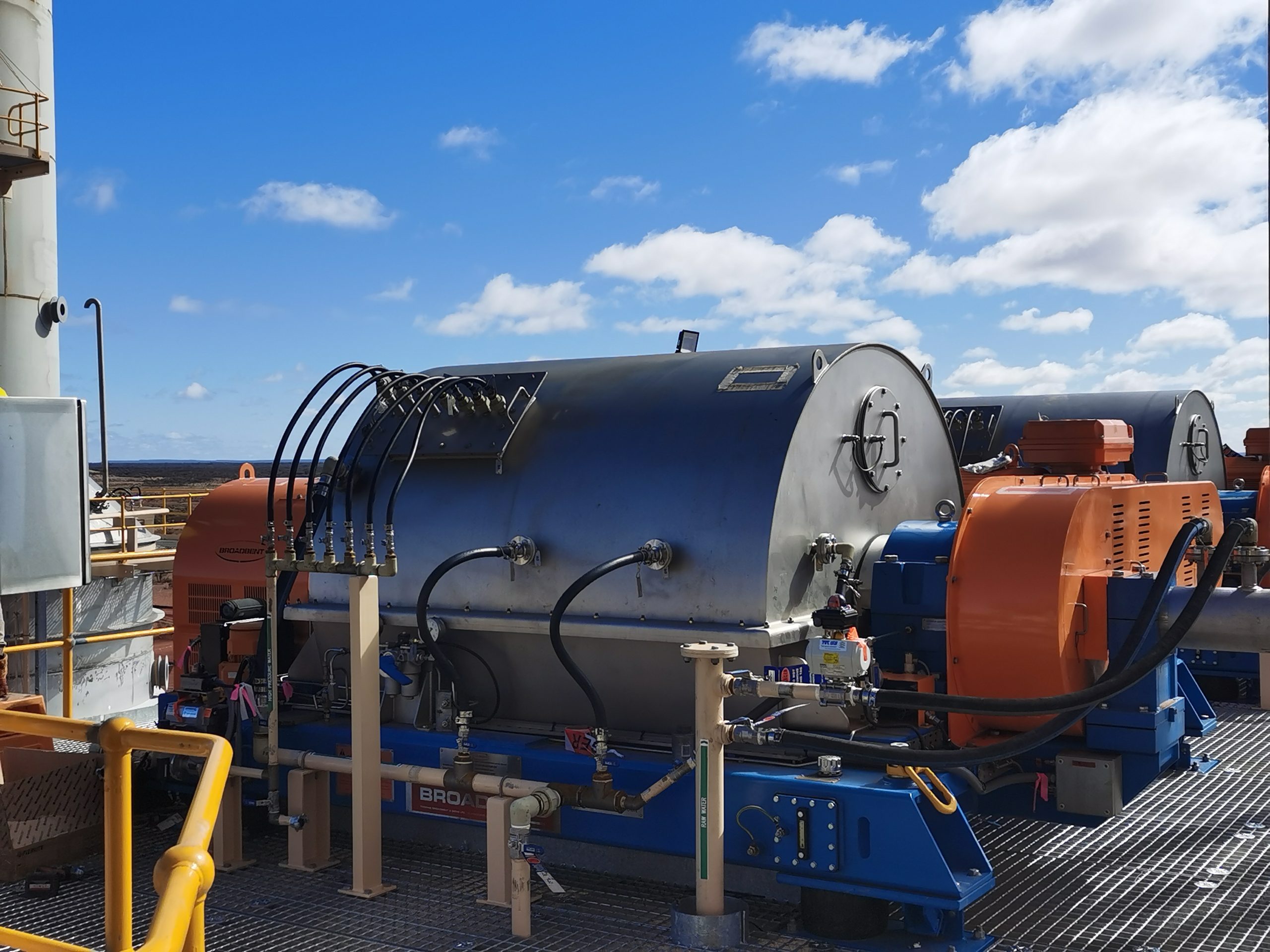Lincom Group is helping bulk operations dewater slurries and concentrates with ease.
Thomas Broadbent and Sons is a British engineering stalwart that, for more than 160 years, has been at the forefront of centrifuge technology.
Founded in Huddersfield, West Yorkshire, in 1864, Broadbent began manufacturing industrial textile machinery, pioneering development into centrifugal separators.
At the time, using centrifugal force to separate solids from liquids or classify different densities was revolutionary, offering speed and efficiency previously unattainable.
Each Australian industry deals with enormous volumes of materials that need to be processed, separated, classified, or dewatered. This is where the centrifuge steps in as an indispensable tool.
Wet products are difficult to transport with conventional bulk handling equipment, Lincom Group product manager Alan Dunbar told ABHR.
“Centrifuges produce a solid cake material that is suitable for mechanical handling, making handling the dewatered cake via belts and chutes significantly easier.”
The unsung heroes of bulk handling
Precise separation can be critical in the production process, from pharmaceuticals to plastics, paints, kaolin, coal, and potash.
Broadbent centrifuges isolate active ingredients, remove impurities, and dewater slurries, ensuring product purity and efficient downstream bulk handling. The extraction and processing of minerals often involve slurries and suspensions that require efficient dewatering. Broadbent centrifuges separate valuable minerals from waste, reduce transportation costs by lowering moisture content, and facilitate environmental compliance by better managing tailings.
Dunbar said the importance of efficient bulk handling in complex manufacturing and resource management cannot be overstated.
“It directly impacts production costs, product quality, environmental footprint, and industry competitiveness,” he said.
“Process operations often involve wet processes – from crushing and grinding to flotation and washing – we generate vast quantities of slurries. While these slurries usually carry valuable materials, they are heavy, difficult to handle, and costly to transport.
“Traditionally, dewatering might involve large settling ponds, which are land-intensive, environmentally challenging (due to potential dam breaches), and inefficient. Other methods, like filter presses, are batch-oriented and less suitable for continuous, high-volume operations.”
Broadbent’s decanter and basket centrifuges, engineered for continuous operation and high G-forces, offer a dramatically more effective solution. They rapidly separate fine solid particles from the liquid phase, delivering a ‘cake’ of dewatered solids with reduced moisture content.
Centrifuges and conveyors
The impact of this dewatering prowess extends directly to the efficiency of bulk material transport, particularly via conveyor belts – the arterial network of any large-scale facility.
Wet products are substantially heavier than their dry counterparts. By dewatering, the overall mass being transported is reduced. This translates to less demand on conveyor belts, motors, and structural components, extending their lifespan and reducing maintenance costs. Operators can also transport more material per tonne, boosting throughput without investing in larger, more expensive conveyor systems.
High moisture content can also lead to material sticking, blockages, carry-back, and messy spillage. This results in material loss and necessitates frequent cleaning and maintenance, leading to costly downtime.
Product consistency, in both dryness and volume, improves conveyor performance.
Dunbar said low moisture content in the feed benefits many processing steps downstream of the centrifuge.
“Broadbent’s continuous design offers products like the Divergent Decanter Centrifuge, which provides the highest throughput and moisture recovery of any comparative machine,” he said.
Related stories:
- Lincom signs distributor deal with MDS
- Lincom expands westward
- Lincom and Thor recognised for stacker success
“A drier product from the centrifuge reduces energy consumption in subsequent drying stages, lowering operational costs and improving the overall efficiency of the entire processing chain.”
Compliance and sustainability
Adhering to transportable moisture limits is a critical safety and regulatory requirement for products shipped globally. Excess moisture can cause bulk cargoes to liquefy during transit, leading to dangerous cargo shifts and potential vessel instability. The receiver will also check moisture content, and penalties may apply if out-of-spec products are received at the end destination. Broadbent centrifuges consistently achieve the low moisture content required to meet standards, ensuring safe and compliant transportation. The ability to recover and reuse process water has also proved to be invaluable. This reduces freshwater consumption, lowers wastewater treatment costs, and enhances environmental sustainability.
Long term support
Lincom Group are the Australian distributors of Broadbent equipment. The two companies work together to ensure the equipment is manufactured to international standards.
Dunbar said Lincom is focused on providing machines that last.
“The cost of overhauling a centrifuge can often be as much as a new machine, so we have worked closely with Broadbent to ensure they will last as long as possible in Australian industries,” he said.
“We also offer service and repair. Lincom has a full workshop equipped with everything needed to repair.
“These machines are an important part of the bulk handling process, so we have invested a lot into a fast turnaround for customers.”
